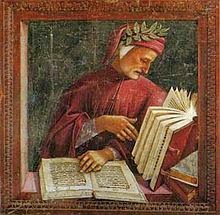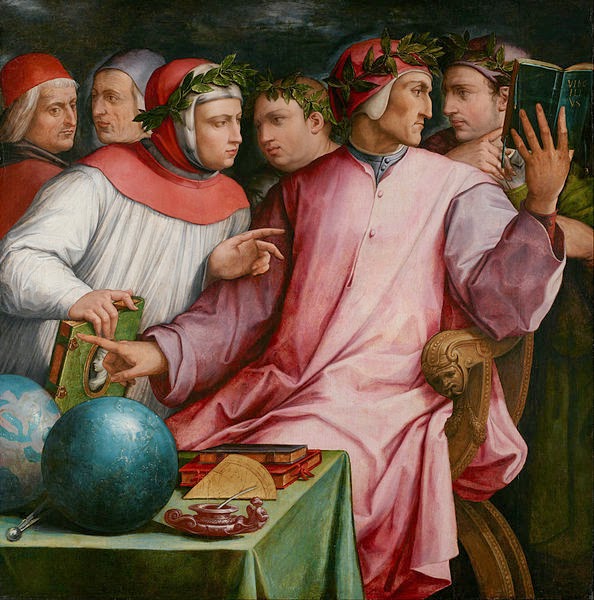“In my Book of Memory, in the early part where there is little to be read, there comes a chapter with the rubric: Incipit vita nova. It is my intention to copy into this little book the words I find written under that heading —- if not all of them, at least the essence of their meaning.”
Beatrice was eight years old and Dante, nine, the first time they set eyes on each other. Instantly, he felt an abiding connection with her, even though it was nine years after that before he finally saw her again, and she greeted him, her words entwining through his heart. Lovely Beatrice, who became Dante’s love, his obsession and his Muse. Never a conversation was had between them, only greetings, yet his life was filled with her presence, her goodness and grace, her being so angelic that she filled his heart until he wondered if it could contain her. All thoughts revolved around his beautiful Beatrice; she was his life and through her, his poetry gained a new vitality.
 |
| Dante’s three meetings with Beatrice Elisabeth Sonrel source Wikipedia |
Vita Nuova, or new life, chronicles Dante’s first sight of Beatrice, his occasional casual meetings with her, his attempt to deflect his interest in her by pretending his poetry was for another woman, her disgust at his perceived behaviour, the death of her father, Dante’s own illness and then, tragically, the death of the woman who had become the centre of his world ….. his lovely Beatrice ……
The book’s structure is unique in itself, as it is organized into chapters (probably by later translators/scribes), but nearly every chapter follows an easily recognizable pattern: first he gives an account of his life circumstances and events, almost like a journal; second he shares a poem where he again relates those circumstances, usually in the form of a sonnet or canzone; and third, an analysis of the poetry, describing his intent and the divisions of thought in each poem.
 |
| Beata Beatrix (1864-70) Dante Gabriel Rossetti source Wikipedia |
The poetry is in the courtly love tradition, a form borrowed from French poets which emphasized chivalry, bravery and nobility. It is important to keep this in mind while reading this story, as the intensity of Dante’s emotions, the near idolization of Beatrice, the groans and sighs, the personification of Love and the professions of near despair can be somewhat hard to relate to in our unromantic day and age.
I found myself vacillating between two different emotions. One one hand I wanted to say, “oh, you poor love-sick man”, and on the other, “what a fool!” Why would you have your entire life be built around the gaze and approval of one person? Why would you wrap your whole soul around a being who was as transient as the wind? As for Beatrice, would it be tragically romantic to be loved this much by someone, or would it be just downright annoying? But then Dante’s poetry began to speak through my cynical view, as his love and devotion to her was so apparent. His descriptions and poetry to her rang with a tender regard, high terms of respect and an abiding love. The vibrancy of his conflicting emotions, which were often buffeted by circumstances, won my heart.
 |
| Dante and Beatrice (1883) Henry Holiday source Wikipedia |
 |
| Dante Alighieri source Wikipedia |
I was also struck my another aspect of the book, something perhaps Dante never meant to emphasis. So many people go through life feeling small and insignificant, wondering how their everyday actions could possibly matter. Well, they do matter and Dante illustrates quite marvellously how. Just Beatrice’s looks affect him for days afterwards. He recounts how her gaze not only brings out his imperfections but challenges him to be a better person. And it’s not just his character that her actions work on; Dante emphasizes that her manner and virtue have an illuminating affect on the ladies who are in her company, and instead of being envious, they appreciate her qualities and feel joyful to be around her. What a testimony to the importance of our every day actions.
 |
| Six Tuscan Poets (Dante Alighieri, Guido Cavalcanti, Francesco Petrarch, Giovanni Boccaccio, Marsilio Ficino & Cristoforo Landino) |
After the death of his love, Beatrice, Dante made a promise, to himself, and by writing the Vita Nuova, to the world. He was going to write about Beatrice, not like he had been writing, following the pattern of a courtly love, but that he would write of her as no other woman had ever been written of before. And twelve years later, the Divina Commedia, or the Divine Comedy was born, immortalizing Beatrice, not only in verse, but in the thrones of Heaven. The Vita Nuova was certainly a new beginning …… a new life ……..
translated by Mark Musa



Beautiful Post Cleo. I love the whole idea of his love for Beatrice. I'm fascinated by how huge an impact she had on Dante's life and work, fueled as it was be so little actual personal interaction. I had no idea how young they were when they first met – she really did permeate his entire life. I believe it's true that sometimes love for another person can be the source of all an artist's energy even if the person is never mentioned. Love of something is necessary for doing anything great. Love for an idea like science or love of wisdom seems wonderfully pure but I think love for an actual human being tends to generate the most powerful energy.
Thanks so much, Carol. I really loved what you said about an artist's energy being generated by love of a person. I have to think about that more and if I can find other works that fall into this category.
The follow-up to the Vita Nuova, for me, is the Inferno, a perfect Halloween read, as you reminded me on your recent blog post!
During my contemplative reading approach these last few days I have learned how much I can think about if I just give myself some time. i read this post a few days ago and did not know how to respond. You have explained beautifully the relationship between Beatrice and Dante. Communication through gestures and gazes can be very powerful. I once read about E.A. Poe's poem Silence. He compared the sea ( the body) and the shore ( the soul). He wanted to explain with his poem that if the body falls silent (dies….) that we can accept. Yet if the soul falls silent ( losing all that makes us unique) that is tragic. I see a similarity here with Beatrice ( body dies..) yet Dante ( writes from the soul) to immortalize her.
I love your comparison, Nancy. It certainly would be a different experience of love …… having to communicate with only the eyes, a few words and information passed between friends. I wonder how much we can actually understand of their feelings living in such a different time and with such different experiences. It so valuable though, to be able to be transported back to this time and get at least some experience of it.
Of particular interest is that they were both betrothed to others (from about 12 years old) and Beatrice had been married a few years before her death, yet Dante never even mentions her marriage. Maybe it was such an accepted and expected event that it had little affect on him. But we'll never know.
I have to read this! I love Dante 🙂
The Rossetti painting there is one of my favourites. It's such a sad panting, I think it was painted after Lizzie Siddal, the model in the painting, died so it's a memorial to her as well.
Great post 🙂
Thanks, O. If you love Dante, you have to read this. It's interesting on so many levels: biography, poetry and poetry analysis.
I didn't know about Lizzie Siddal. The things we learn from each other! It's great! I'm going to go look her up.
Mark Musa is so good with this period. His Petrarch is unbeatable. I've read the Dante Gabriel Rossetti version of La Vita Nuova a couple of times, but maybe next time I'll go with Musa.
Nice job writing about this odd, odd book.
Thanks, Tom! If I'm going to read Dante, I really need to read Petrarch, don't I? Musa appeared to be a decent translation in this case, but I don't have anything to compare it to. I've heard his Divine Comedy translation doesn't flow as nicely as some of the others, but he does tend towards faithfulness to the text which I prefer. When choosing translations, it's always a struggle. Either that or learn Italian!
This collection of Musa's Petrarch is perfect. One reason it is perfect – note the length.
Holy cow, the complete works is 800 pages and $50 for a paperback!! The one you suggested should be perfect for a sampling of his works. 😉